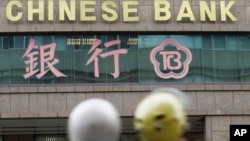The U.S. Senate Banking Committee unanimously backed new sanctions targeting Chinese banks that do business with North Korea on Tuesday, just before President Donald Trump visits Beijing for the first time since taking office.
As well as strengthening existing sanctions and congressional oversight, the measure will target foreign financial institutions — in China and elsewhere — that provide services to those subject to North Korea-related sanctions by the U.S. Congress, a presidential order or U.N. Security Council resolution.
All 12 Republicans and 11 Democrats on the panel voted for the "Otto Warmbier Banking Restrictions Involving North Korea (BRINK) Act," clearing the way for its consideration by the full Senate.
The bill was named after a U.S. student who died earlier this year after he was imprisoned in North Korea, further chilling already poor relations between Washington and Pyongyang.
"For too long, we've been complacent about the growing and gathering threat from the North Korean regime," Republican Pat Toomey, one of the bill's authors, said after the committee voted.
Democratic Senator Chris Van Hollen, another author, said that in addition to Chinese banks, Malaysian financial institutions might end up in its sights.
Trump is due to wrap up a visit to Seoul on Wednesday with a major speech on North Korea, and then shift focus to China, where he is expected to press a reluctant President Xi Jinping to tighten the screws further on Pyongyang.
Some of Trump's fellow Republicans, as well as many Democrats, have been critical of Trump's bellicose rhetoric about North Korea, and have called for the use of economic tools like sanctions or more negotiations before talking of war.
Washington so far has largely held off on imposing new sanctions against Chinese banks and companies doing business with North Korea, given fears of retaliation by Beijing and possibly far-reaching effects on the world economy.
Van Hollen told reporters on Monday ahead of the committee vote that he wished Trump would follow the model of President Theodore Roosevelt and "speak softly and carry a big stick," adding: "We're trying to give him a little bigger stick with the sanctions."
Republican and Democratic lawmakers said last week they had reached a bipartisan agreement on the sanctions bill. A companion bill has been introduced in the House of Representatives.
The leaders of the Republican-led Senate have not said when the chamber might vote on the legislation.







